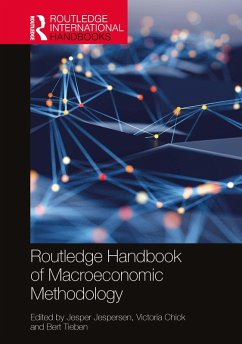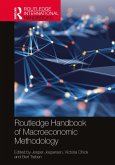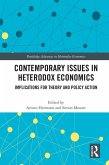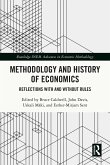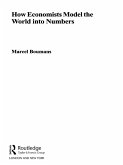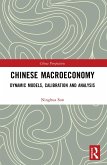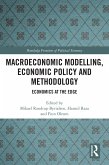Routledge Handbook of Macroeconomic Methodology (eBook, PDF)
Redaktion: Jespersen, Jesper; Tieben, Bert; Chick, Victoria
45,95 €
45,95 €
inkl. MwSt.
Sofort per Download lieferbar

23 °P sammeln
45,95 €
Als Download kaufen

45,95 €
inkl. MwSt.
Sofort per Download lieferbar

23 °P sammeln
Jetzt verschenken
Alle Infos zum eBook verschenken
45,95 €
inkl. MwSt.
Sofort per Download lieferbar
Alle Infos zum eBook verschenken

23 °P sammeln
Routledge Handbook of Macroeconomic Methodology (eBook, PDF)
Redaktion: Jespersen, Jesper; Tieben, Bert; Chick, Victoria
- Format: PDF
- Merkliste
- Auf die Merkliste
- Bewerten Bewerten
- Teilen
- Produkt teilen
- Produkterinnerung
- Produkterinnerung

Bitte loggen Sie sich zunächst in Ihr Kundenkonto ein oder registrieren Sie sich bei
bücher.de, um das eBook-Abo tolino select nutzen zu können.
Hier können Sie sich einloggen
Hier können Sie sich einloggen
Sie sind bereits eingeloggt. Klicken Sie auf 2. tolino select Abo, um fortzufahren.

Bitte loggen Sie sich zunächst in Ihr Kundenkonto ein oder registrieren Sie sich bei bücher.de, um das eBook-Abo tolino select nutzen zu können.
This book is a presentation of the study of the methods by which macroeconomics is researched, taught and communicated, and why specific theories, research strategies and teaching are preferred. A range of experts provide analysis of the concepts, ideas and principles to give a better understanding of the macroeconomics behind policies.
- Geräte: PC
- mit Kopierschutz
- eBook Hilfe
Andere Kunden interessierten sich auch für
![Routledge Handbook of Macroeconomic Methodology (eBook, ePUB) Routledge Handbook of Macroeconomic Methodology (eBook, ePUB)]() Routledge Handbook of Macroeconomic Methodology (eBook, ePUB)45,95 €
Routledge Handbook of Macroeconomic Methodology (eBook, ePUB)45,95 €![Contemporary Issues in Heterodox Economics (eBook, PDF) Contemporary Issues in Heterodox Economics (eBook, PDF)]() Contemporary Issues in Heterodox Economics (eBook, PDF)49,95 €
Contemporary Issues in Heterodox Economics (eBook, PDF)49,95 €![Methodology and History of Economics (eBook, PDF) Methodology and History of Economics (eBook, PDF)]() Methodology and History of Economics (eBook, PDF)41,95 €
Methodology and History of Economics (eBook, PDF)41,95 €![How Economists Model the World into Numbers (eBook, PDF) How Economists Model the World into Numbers (eBook, PDF)]() Marcel BoumansHow Economists Model the World into Numbers (eBook, PDF)45,95 €
Marcel BoumansHow Economists Model the World into Numbers (eBook, PDF)45,95 €![Economic Crisis and Economic Thought (eBook, PDF) Economic Crisis and Economic Thought (eBook, PDF)]() Economic Crisis and Economic Thought (eBook, PDF)43,95 €
Economic Crisis and Economic Thought (eBook, PDF)43,95 €![Chinese Macroeconomy (eBook, PDF) Chinese Macroeconomy (eBook, PDF)]() Ninghua SunChinese Macroeconomy (eBook, PDF)41,95 €
Ninghua SunChinese Macroeconomy (eBook, PDF)41,95 €![Macroeconomic Modelling, Economic Policy and Methodology (eBook, PDF) Macroeconomic Modelling, Economic Policy and Methodology (eBook, PDF)]() Macroeconomic Modelling, Economic Policy and Methodology (eBook, PDF)41,95 €
Macroeconomic Modelling, Economic Policy and Methodology (eBook, PDF)41,95 €-
-
-
This book is a presentation of the study of the methods by which macroeconomics is researched, taught and communicated, and why specific theories, research strategies and teaching are preferred. A range of experts provide analysis of the concepts, ideas and principles to give a better understanding of the macroeconomics behind policies.
Dieser Download kann aus rechtlichen Gründen nur mit Rechnungsadresse in A, B, BG, CY, CZ, D, DK, EW, E, FIN, F, GR, HR, H, IRL, I, LT, L, LR, M, NL, PL, P, R, S, SLO, SK ausgeliefert werden.
Produktdetails
- Produktdetails
- Verlag: Taylor & Francis
- Seitenzahl: 380
- Erscheinungstermin: 20. Juni 2023
- Englisch
- ISBN-13: 9781317597001
- Artikelnr.: 67850458
- Verlag: Taylor & Francis
- Seitenzahl: 380
- Erscheinungstermin: 20. Juni 2023
- Englisch
- ISBN-13: 9781317597001
- Artikelnr.: 67850458
- Herstellerkennzeichnung Die Herstellerinformationen sind derzeit nicht verfügbar.
Jesper Jespersen is professor emeritus at Roskilde University, Denmark. His research interests include the economics of Keynes and macroeconomic methodology. Victoria Chick is professor emeritus at University College London, UK. She has written extensively on macroeconomics and the economics of Keynes. Bert Tieben is researcher at SEO Amsterdam Economics, the Netherlands. He also teaches history of economic thought at Amsterdam University College. His research focuses on economic methodology and the history of economic thought.
Introduction: The scope and content of the Handbook I. Philosophy of
Science Perspectives I.1. Methodological Individualism and Macroeconomics
I.2. Deduction, Induction and Abduction I.3. Instrumentalism I.4 From
positivism to naturalism in macroeconomics I.5. Holism & Fallacy of
Composition I.6. Macroeconomics and Ethics II. Concepts II.1 Time in
Macroeconomics II.2 Uncertainty and Macroeconomic Methodology II.3 Path
dependency II.4 Equilibrium II.5 Causality and macroeconomics II.6
Microeconomic foundation of macroeconomics II.7 Open and closed systems
II.8. Money and Macroeconomic Methodology III. Schools of Thought III.1.
Classical Political Economy III.2. Neoclassical Macroeconomics III.3.
Keynes's Macroeconomic Method III.4. Post Keynesian Methodology III.5. The
Austrian Denial of Macroeconomics III.6. What was Marx's Method, actually?
III.7. Methodological Pluralism in Macroeconomics IV. Models, Econometrics
and Measurement IV.1. Use of Mathematics in macroeconomic analysis IV.2.
Explanation and Forecasting IV.3. Using macroeconomic models in policy
practice IV.4. Traditional Methods of Macroeconometrics IV.5.
Macroeconometrics: Cointegrated VAR Method IV.6. National Accounts and
Macroeconomic Methodology V. Communicating Macroeconomics V.1. The
rhetorical perspective on macroeconomics V.2. Teaching Macroeconomic
Methodology
Science Perspectives I.1. Methodological Individualism and Macroeconomics
I.2. Deduction, Induction and Abduction I.3. Instrumentalism I.4 From
positivism to naturalism in macroeconomics I.5. Holism & Fallacy of
Composition I.6. Macroeconomics and Ethics II. Concepts II.1 Time in
Macroeconomics II.2 Uncertainty and Macroeconomic Methodology II.3 Path
dependency II.4 Equilibrium II.5 Causality and macroeconomics II.6
Microeconomic foundation of macroeconomics II.7 Open and closed systems
II.8. Money and Macroeconomic Methodology III. Schools of Thought III.1.
Classical Political Economy III.2. Neoclassical Macroeconomics III.3.
Keynes's Macroeconomic Method III.4. Post Keynesian Methodology III.5. The
Austrian Denial of Macroeconomics III.6. What was Marx's Method, actually?
III.7. Methodological Pluralism in Macroeconomics IV. Models, Econometrics
and Measurement IV.1. Use of Mathematics in macroeconomic analysis IV.2.
Explanation and Forecasting IV.3. Using macroeconomic models in policy
practice IV.4. Traditional Methods of Macroeconometrics IV.5.
Macroeconometrics: Cointegrated VAR Method IV.6. National Accounts and
Macroeconomic Methodology V. Communicating Macroeconomics V.1. The
rhetorical perspective on macroeconomics V.2. Teaching Macroeconomic
Methodology
Introduction: The scope and content of the Handbook I. Philosophy of
Science Perspectives I.1. Methodological Individualism and Macroeconomics
I.2. Deduction, Induction and Abduction I.3. Instrumentalism I.4 From
positivism to naturalism in macroeconomics I.5. Holism & Fallacy of
Composition I.6. Macroeconomics and Ethics II. Concepts II.1 Time in
Macroeconomics II.2 Uncertainty and Macroeconomic Methodology II.3 Path
dependency II.4 Equilibrium II.5 Causality and macroeconomics II.6
Microeconomic foundation of macroeconomics II.7 Open and closed systems
II.8. Money and Macroeconomic Methodology III. Schools of Thought III.1.
Classical Political Economy III.2. Neoclassical Macroeconomics III.3.
Keynes's Macroeconomic Method III.4. Post Keynesian Methodology III.5. The
Austrian Denial of Macroeconomics III.6. What was Marx's Method, actually?
III.7. Methodological Pluralism in Macroeconomics IV. Models, Econometrics
and Measurement IV.1. Use of Mathematics in macroeconomic analysis IV.2.
Explanation and Forecasting IV.3. Using macroeconomic models in policy
practice IV.4. Traditional Methods of Macroeconometrics IV.5.
Macroeconometrics: Cointegrated VAR Method IV.6. National Accounts and
Macroeconomic Methodology V. Communicating Macroeconomics V.1. The
rhetorical perspective on macroeconomics V.2. Teaching Macroeconomic
Methodology
Science Perspectives I.1. Methodological Individualism and Macroeconomics
I.2. Deduction, Induction and Abduction I.3. Instrumentalism I.4 From
positivism to naturalism in macroeconomics I.5. Holism & Fallacy of
Composition I.6. Macroeconomics and Ethics II. Concepts II.1 Time in
Macroeconomics II.2 Uncertainty and Macroeconomic Methodology II.3 Path
dependency II.4 Equilibrium II.5 Causality and macroeconomics II.6
Microeconomic foundation of macroeconomics II.7 Open and closed systems
II.8. Money and Macroeconomic Methodology III. Schools of Thought III.1.
Classical Political Economy III.2. Neoclassical Macroeconomics III.3.
Keynes's Macroeconomic Method III.4. Post Keynesian Methodology III.5. The
Austrian Denial of Macroeconomics III.6. What was Marx's Method, actually?
III.7. Methodological Pluralism in Macroeconomics IV. Models, Econometrics
and Measurement IV.1. Use of Mathematics in macroeconomic analysis IV.2.
Explanation and Forecasting IV.3. Using macroeconomic models in policy
practice IV.4. Traditional Methods of Macroeconometrics IV.5.
Macroeconometrics: Cointegrated VAR Method IV.6. National Accounts and
Macroeconomic Methodology V. Communicating Macroeconomics V.1. The
rhetorical perspective on macroeconomics V.2. Teaching Macroeconomic
Methodology
